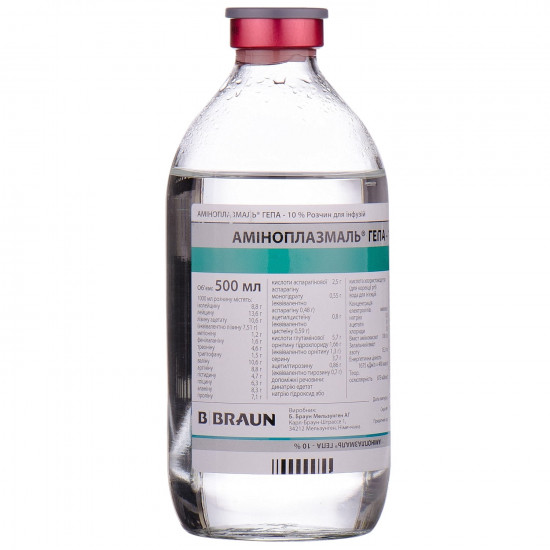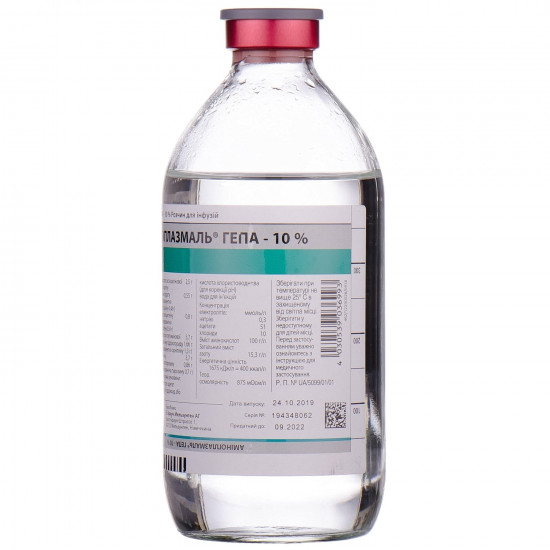



- Stock: In Stock
- Model: 176756
0% Customers recommend this product
-
5 Awesome0%
-
4 Great0%
-
3 Average0%
-
2 Bad0%
-
1 Poor0%
Reviews Over Gep's aminoplasmal solution for inf. 10% fl. 500 ml No. 10
- (0)
Total Reviews (0)
click here write review to add review for this product.
Report this review.
Description
Pharmacological properties
Amino-acid structure of medicine an aminoplasmal gepa-10 is based by % on results of researches of amino acids at patients with cirrhosis. at these patients note the typical violations of amino-acid balance which are characterized by the low concentration of amino acids with a branched chain increased by concentration of aromatic amino acids and the raised concentration of methionine. these imbalances regard as one of the reasons of decrease in proteinaceous tolerance and development of a hepatic coma in patients with cirrhosis. the composition of medicine which is characterized by the increased content of amino acids with a branched chain is adapted to amino-acid and proteinaceous metabolism of patients with cirrhosis. introduction aminoplazmalya gepa-10 the % can reach correction of the broken balance of amino acids. at the same time cerebral manifestations of a number of diseases, for example hepatic encephalopathy, a hepatic prekoma or a coma are weakened, and the proteinaceous tolerance and biosynthesis of protein considerably improve.
Indication
Providing an organism with amino acids at parenteral nutrition of patients with a heavy liver failure and also at threat of development of hepatic encephalopathy.
Use
is Entered in the way in to infusions to a vena cava. depending on individual requirements the dose for adults and children is aged more senior than 2 years makes 7–10 ml/kg of body weight a day that corresponds to 0.7-1.0 g of amino acids/kg of body weight a day. the maximum dose for adults and children is aged more senior than 2 years — 15 ml/kg of body weight a day that corresponds to 1.5 g of amino acids/kg of body weight a day.
infusion Speed:
Treatment at a hepatic coma
Aminoplazmal's infusion is recommended to begin Gepa-10 of % withIn hepatic encephalopathy with the increased initial speed and to enter it before effect: from 1st to the 2nd hour — 2 ml/kg/h; from the 3rd to the 4th hour — 1 ml/kg/h; since the 5th hour — 0.6 ml/kg/h
For example, to the patient with the body weight of 70 kg appoint:
from 1st to the 2nd hour: 150 ml/h (2 ml/kg/h) that corresponds to about 50 drops/min., from the 3rd to the 4th hour: 75 ml/h (1 ml/kg/h) — about 25 thaws/min., since the 5th hour: 45 ml/h (0.6 ml/kg/h) — about 15 thaws/min.
Maintenance therapy / parenteral nutrition
45-75 ml/h that corresponds to 15-25 drops/min. (0.6-1.0 ml/kg/h).
application Duration: The aminoplasmal of Gepa-10 of % should be applied until there is a threat of development of hepatic encephalopathy.
Contraindication
Disturbance of amino-acid exchange of not hepatic etiology, shock of various etiology, acidosis, overhydratation, hypopotassemia, hyponatremia.
children under 2 years haveData on Aminoplazmal's application no Gepa-10 of %. Therefore before obtaining authentic data the medicine introduction is not recommended to these patients.
Side effects
and in the recommended doses are not revealed byAt use of medicine according to indications.
Special instructions to Patients with the accompanying renal failure an aminoplasmal gepa-10% appointby
only after assessment of risk of therapy and the expected favorable effect. the dose is selected depending on the level of urea and creatinine in blood serum. with care appoint at treatment of patients from the blood plasma raised by osmolarity. therapy by amino acids does not replace the therapeutic actions hosted for treatment of hepatic encephalopathy, such as use of depletive, use of lactulose and/or purgation from microorganisms by means of antibiotics.
Aminoplazmal's Infusion should combine Gepa-10 of % with introduction of carbohydrates. Clinical control has to include regular check of water and electrolytic balance of blood plasma. Administration of electrolytes is carried out on requirement.
Pharmacological interactions are not known toInteraction
for. in connection with risk of microbic planting and physical and chemical incompatibility it is not recommended to administer any other medicaments in solution aminoplazmalya gepa-10%.
Overdose
Overdose or too high speed of infusion can cause nausea, a fever, vomiting and loss of amino acids through kidneys. introduction of medicine should be stopped and resumed later at a reduced speed of infusion.
Storage conditions
B the place protected from light at a temperature up to 25 °C. after opening of a bottle, medicine has to be used immediately. unused contents are not subject to storage.
Specifications
| Characteristics | |
| Active ingredients | L-alanine, L-aspartic acid, L-histidine, L-serine, L-threonine, Arginine, Asparagine monohydrate, Atsetiltirozin, Atsetiltsistein, Valin, Glitsin, Izoleytsin, glutaminic acid, Leytsin, Lizin acetate, Methionine, Ornithine hydrochloride, Proline, Tryptophane, Phenylalanine |
| Amount of active ingredient | 100 mg/ml |
| Applicant | B. Braun |
| Code of automatic telephone exchange | Amino acid B05BA01 |
| Interaction with food | It doesn't matter |
| Light sensitivity | Sensitive |
| Market status | Traditional |
| Origin | Chemical |
| Prescription status | According to the prescription |
| Primary packing | bottle |
| Producer | B. BRAUN MELZUNGEN AG |
| Quantity in packing | 10 bottles on 500 ml |
| Release form | solution for infusions |
| Route of administration | Infusional |
| Sign | Import |
| Storage temperature | from 5 °C to 25 °C |
| Trade name | Aminoplasmal |














































